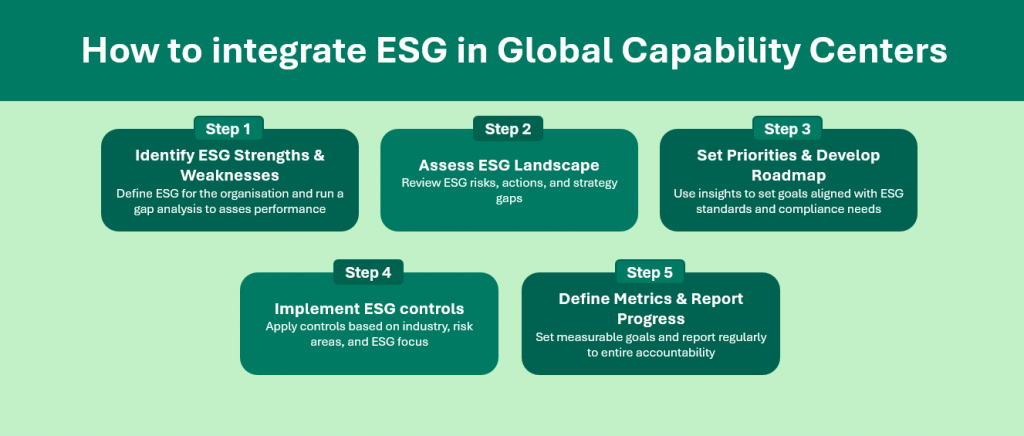Sustainable GCCs In India: How They’re Integrating ESG Principles
Published on
As global mandates evolve, embedding Environmental, Social, and Governance (ESG) considerations into GCC operations is no longer optional—it’s a defining pillar of long-term value creation. According to a recent survey based on insights from over 45 GCCs, 52% of GCCs in India have proactively adopted ESG policies and are refining their internal processes to support them.
These centers, established by large companies to deliver a range of services and responsible operations, are playing a growing role in driving sustainability efforts. The report also highlights that around 70% of GCCs are actively seeking technology partnerships to implement ESG norms.
This signals a shift towards integrating environmental, social, and ethical considerations into core operations, positioning GCCs as critical enablers of responsible and future-focused business practices.
ESG at GCCs: Why it Matters
Integrating the principles of ESG in GCCs is a strategic step that enhances their role and impact across the organisation. A centralized ESG function empowers GCCs to turn sustainability ambitions into measurable business outcomes.
Here is why ESG is increasingly important in GCC operations:
- A central ESG function within a GCC enables stronger sustainability integration across operations
- Consistent ESG performance and transparency builds trust among investors
- Environmental and social factors increasingly shape consumer preferences
- Fair, sustainable workplaces help attract and retain skilled talent
- Regulations across industries are making ESG compliance a requirement
- Strong ESG practices support access to funding and lower capital costs
- High ESG ratings often correlate with better stock market outcomes
- Robust ESG strategies enhance brand value and reduce reputational risks
- A clear ESG commitment strengthens competitiveness in talent acquisition
- Proactive ESG adoption ensures alignment with evolving compliance standards
- ESG alignment supports long-term resilience against environmental and social disruptions
- Global clients increasingly expect ESG-aligned practices in partner operations
Steps to Integrate ESG
A structured ESG framework supports the development of a sustainable GCC by aligning operations with sustainability goals, regulatory needs, and stakeholder expectations. Here are five key steps to guide the integration:

Measuring ESG Impact
To evaluate the effectiveness of ESG initiatives, organisations can assess performance across Environmental, Social, and Governance pillars. Each pillar includes specific focus areas that guide measurement and reporting.
Environmental
Key indicators related to sustainability and resource efficiency include:
- Energy usage and efficiency
- Climate change strategy
- Waste reduction
- Biodiversity loss
- Greenhouse gas emissions
- Carbon footprint reduction
- Water consumption and conservation
- Use of sustainable or recycled materials
- Pollution control and mitigation efforts
Social
Metrics that reflect employee welfare, equality, and community impact include:
- Fair pay and living wages
- Equal employment opportunity
- Employee benefits
- Workplace health and safety
- Community engagement
- Responsible supply chain partnerships
- Adhering to labor laws
- Employee training and career development
- Support for mental health and well-being
Governance
Areas that determine ethical leadership and organisational accountability include:
- Risk management
- Corporate governance
- Compliance
- Ethical business practices
- Avoiding conflicts of interest
- Accounting integrity and transparency
- Board independence and oversight
- Data privacy and cybersecurity policies
- ESG integration into corporate strategy
Together, these ESG metrics provide a structured approach to assess impact and align with stakeholder expectations. Embedding ESG across operations drives GCC sustainability, supports regulatory readiness, and ensures long-term responsible growth.
Global Best Practices
These practices help align operations with stakeholder expectations, enhance resilience, and demonstrate long-term business responsibility.
Environmental Best Practices
- Focus on minimising environmental impact across operations, products, and supply chains
- Use renewable energy and aim for net-zero emissions
- Design greener products and services
- Adopt zero-waste packaging using biodegradable materials
- Switch to energy-efficient systems for security and infrastructure
- Promote recycling and reduce landfill waste
- Optimise water usage through conservation and reuse systems
- Monitor and reduce pollution across air, water, and soil sources
Social Best Practices
- Address social responsibility in workplace culture, supply chains, and community engagement
- Ensure product safety and protect customer data
- Prevent labour rights violations, including modern slavery
- Support employee health, safety, and well-being through training and policies
- Promote diversity and inclusion across the workforce
- Invest in local community development, such as educational programmes
- Foster transparent communication and employee feedback mechanisms
- Encourage volunteerism and employee participation in social initiatives
Governance Best Practices
- Ensure ethical decision-making, accountability, and transparency in operations
- Provide accurate reporting on financials, strategy, and ESG performance
- Hold leaders accountable for risk management and operational results
- Implement strong anti-bribery and ethical business policies
- Maintain diversity in leadership and disclose executive pay practices transparently
- Establish clear ESG oversight through board-level committees or roles
- Align executive incentives with long-term ESG and business objectives
- Conduct regular internal audits to monitor compliance and governance effectiveness
Embedding ESG in GCC operations allows organisations to align global delivery with sustainability, equity, and compliance goals. While digital transformation is often the core focus, GCCs also provide a strong foundation for ESG integration.
Case Study
ANSR’s work with a Fortune 500 healthcare company to establish a digital GCC in Bengaluru illustrates this potential. The center was built with inclusive hiring, structured governance, and scalable infrastructure — key enablers for future ESG-aligned growth. Such examples demonstrate that embedding ESG does not require a separate track; rather, it can be integrated from day one. To design a GCC that combines operational excellence with responsible growth, connect with ANSR and explore our custom ESG-ready models.




